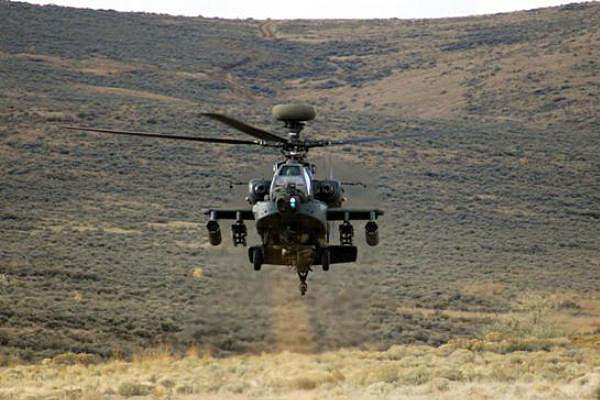The U.S. Army on Monday night ended a weeklong grounding of its stateside rotary fleet of more than 1,100 aircraft after a five-day shutdown to review safety procedures, the service said.
The grounding came after three helicopters in as many locations crashed within 10 days, killing a total of eight soldiers, according to Army Forces Command, or Forscom.
The training accidents brought the total of Class A mishaps -- accidents in which there is a fatality or more than $2 million damage -- to four in fiscal 2016, which began on Oct. 1, according to the Army’s Combat Readiness Center at Fort Rucker, Alabama. The fourth was non-fatal.
By comparison, a total of 13 such accidents occurred in all of fiscal 2015, resulting in 15 fatalities, according to the center.
The Army on Sunday identified the two soldiers who were killed Nov. 23 when the AH-64 Apache they were flying in crashed about 50 miles east of Camp Humphreys in South Korea. The soldiers were Chief Warrant Officer 4 Jason McCormack, 43, and Chief Warrant Officer 3 Brandon Smith, 38.
South Korean news reports said the Apache, which crashed on a mountain road near Wonju, may have hit utility power lines. Both McCormack and Smith were assigned to 4-2 Attack Reconnaissance Battalion, 2nd Combat Aviation Brigade, 2nd Infantry Division.
Two more fatal helicopter crashes in the U.S. within 10 days led Gen. Robert B. "Abe" Abrams, the Forscom commander, to order on Dec. 3 a five-day grounding of the Army’s entire rotary fleet in the continental U.S. to review safety procedures, maintenance and crew preparation. The order did not apply to the combatant commands in Europe, the Mideast, the Pacific and elsewhere.
"We cannot allow tragedy to pass unacknowledged," Abrams said at the time, a move that Army officials described as unprecedented. "We must do whatever is needed to make certain that our soldiers are training and operating safely."
Abrams said the safety review stressed "adherence to flight-operations standards and disciplines" as well as the "flight-mission briefing process with an emphasis on risk mitigation, crew selection, flight planning, crew/flight briefings, debriefings and after-action reviews."
On the same day as the South Korea crash, a UH-60L Black Hawk went down at Fort Hood, Texas, killing four soldiers during another routine training accident, including Sgt. 1st Class Toby A. Childers, 40, of Hays, Kansas; Chief Warrant Officer 3 Stephen B. Cooley, 40, of Cantonment, Florida; Sgt. 1st Class Jason M. Smith, 35, of Destrehan, Louisiana; and Chief Warrant Officer 3 Michael F. Tharp, 40, of Katy, Texas.
In the most recent deadly helicopter crash, two soldiers from Fort Campbell, Kentucky, were killed Dec. 2 when their AH-64E Apache crashed on a training flight in a rural area of Tennessee about 12 miles south of the base. The soldiers were identified as Chief Warrant Officer 2 Alex Caraballoleon, 35, and Chief Warrant Officer 2 Kevin M. Weiss, 32, both decorated, long-time Apache pilots.
--Richard Sisk can be reached at Richard.Sisk@military.com.
Related Video:




























